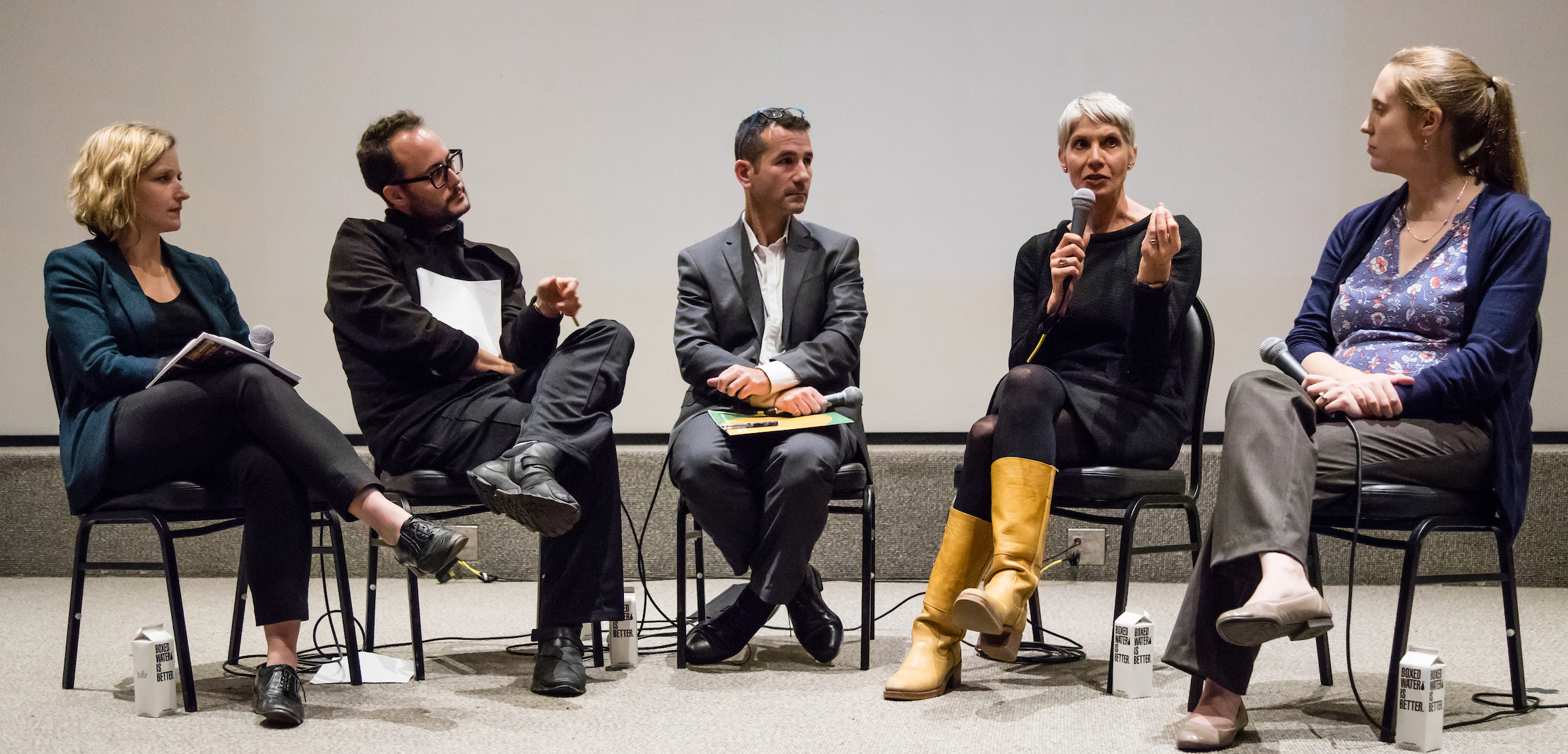To mark the opening of the Mead Art Museum’s latest exhibition—Yinka Shonibare MBE, The American Library Collection (Activists)—Emily Potter-Ndiaye, the Andrew W. Mellon Curator of Academic Programs, hosted four Amherst faculty members in a panel conversation inspired by the exhibition’s central themes: the history of colonialism and its impact on the migration of people, objects and ideas.
The exhibition is the fourth iteration of the Rotherwas Project series that showcases contemporary art in the museum’s 17th century wood-paneled room. It includes three works by British-born Nigerian artist Yinka Shonibare:
- The American Library Collection (Activists), recently acquired by the Mead, presents 233 books wrapped in the artist’s signature wax-fabric and emblazoned with the names of activists from across the political spectrum. Many are immigrants or children of immigrants, while others are anti-immigrant proponents. Shelved together, they call attention to the varied perspectives that have shaped historical and present day conversations about immigration and diversity in the United States. The work also serves as a commentary about which people and what ideas get published and thereby become part of public discourse.
- Girl Balancing Knowledge and Nelson’s Ship in a Bottle similarly incorporate the artist’s signature wax-fabric and pose questions about the role of colonialism in shaping perceptions of race, knowledge and identity.
During the panel conversation, professors Javier Corrales, Caroline Theoharides, Leah Schmalzbauer and Niko Vicario spoke about their research using Shonibare’s work as an entry point.

From left: Emily Potter-Ndiaye, Niko Vicario, Javier Corrales, Leah Schmalzbauer and Caroline Theoharides
Vicario, assistant professor of art and the history of art, began the discussion by illuminating the complexity of one of the central features of Shonibare’s work: his signature, brightly colored wax-fabric. Typically recognized as African, Vicario said the fabric can be traced back to the Indonesian Batik technique of wax-dyeing patterns, which was then appropriated by the Dutch, who brought their version of this technique to West Africa in the 1880s. “Complicating the boundaries between what is African and what isn’t,” he said, “and what is the product of global circulation, histories of imperialism and histories of trade is what I find to be particularly resonant in Shonibare’s work.”
Corrales, the Dwight W. Morrow 1895 Professor of Political Science, whose work focuses on political economy, extremism in politics and queer issues, connected Shonibare’s fabric to the pleated-skirt and shawl of Bolivian national dress. “What is interesting about this now nationalist outfit is that it’s a colonial import,” Corrales said. What was once a dress that colonial authorities forced Spanish people to wear, “the clothes of the oppressor,” he said, has become a source of pride. Shonibare’s fabric and Bolivian national dress, he said, are two examples of how, over time, colonial legacies can become part of native national identities.
Schmalzbauer, the William R. Kenan Professor of American Studies and Sociology, researches the effects of contemporary global capitalism on the movement of people across international borders. She said she often thinks about how prevalent narratives about immigration can impact social discourse, similar to Shonibare’s commentary on how certain people and ideas are published and shared. “Something I hear a lot is, I don’t mind migration, I just wish they did it like my ancestors did, legally,” Schmalzbauer said. This narrative, she said, overlooks the fact that certain groups of people have been excluded from legal immigration to the U.S. at various times in history.
Theoharides, assistant professor of economics, studies labor markets in developing countries and how the movement of people impacts economic development. For example, she said, the wages immigrants working in another country send back to their families leads to increases in consumption and investments in their home countries. In relation to Shonibare’s work, she talked about how ideas migrants are exposed to when they’re abroad—from political ideologies to architectural techniques—also impact the social fabric and economies of their home countries.
Rotherwas Project 4: Yinka Shonibare MBE, The American Library Collection (Activists) remains on view at the Mead Art Museum through Jan. 6, 2019.
To learn more about each professor’s research and courses, visit their faculty profiles:


